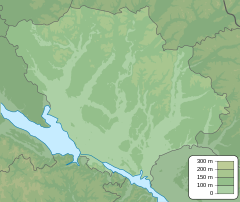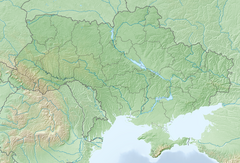Mharsky Monastery
| Mhar Monastery | |
|---|---|
Ukrainian: Мгарський монастир | |
 Transfiguration Monastery at Mhar' | |
| General information | |
| Architectural style | Ukrainian Baroque |
| Location | Mhar, Poltava Oblast, Ukraine |
| Country | |
| Coordinates | 50°01′47″N 33°03′18″E / 50.02972°N 33.05500°E |
| Owner | Ukrainian Orthodox Church (Moscow Patriarchate) |
| Official name | Спасо-Преображенський Мгарський монастир (комплекс) (Saviour-Transfiguration Mhar Monastery (complex)) |
| Type | Architecture |
| Reference no. | 160054 |
The Mhar Monastery (Ukrainian: Мгарський монастир; full name: Saviour-Transfiguration Mhar Monastery) is a male monastery of the Ukrainian Orthodox Church (Moscow Patriarchate) on the bank of the Sula River near Lubny, Poltava Oblast, Ukraine. Originally built by the Ukrainian clergy of the Ecumenical Patriarchate of Constantinople, since the 18th century (1709 Battle of Poltava) it belongs to the Russian Orthodox Church.
It was founded in 1619 by Isaia Kopynsky (who later became the Metropolitan of Kyiv of the reinstated Ruthenian Orthodox Church) on the money of Princess Regina Wiśniowiecka (cousin of Metropolitan Petro Mohyla) as a bratstvo designed to become a bulwark of Orthodoxy in the eastern part of the Polish–Lithuanian Commonwealth.[1]
The monastery grounds contain the graves of several Kyivan metropolitans. It was there that Yurii Khmelnytsky took the tonsure as Hedeon Khmelnytskyi and St. Athanasius III of Constantinople (an ecumenical patriarch) died and was buried.[2]
The Ukrainian Baroque katholikon was erected in the 1680s with the help of a generous grant from Hetmans Ivan Samoylovych and Ivan Mazepa. The seven-domed church with six piers was designed by a German architect who had worked on the Trinity Cathedral in Chernihiv. The number of domes was reduced to five after the central cupola had collapsed in 1728.[3] A free-standing Neoclassical bell tower was started in 1785, but was not completed until 60 years later.[3]
After 1925 the monastery was occupied by the leaders of the so called Lubny Schism (Russian terminology), then under the Bolshevik administration it housed a succession of institutions for children, including a Young Pioneer camp, until the monks were allowed to return there in 1993.[2]
On November 22, 2013, President of Ukraine Viktor Yanukovych signed a decree "On Measures to Celebrate the 400th Anniversary of the Founding of the Mhar Monastery",[4] which provides for the implementation of measures to preserve and restore buildings and objects located on the territory of the Mhar Monastery, as well as the construction of a library building in 2014-2019.[5]
Important burials
References
- ^ Welcome to Ukraine Magazine
- ^ a b Official website
- ^ a b Памятники градостроительства и архитектуры Украинской ССР
- ^ "Про заходи щодо відзначення 400-річчя заснування Мгарського... | from 22.11.2013 № 646/2013". 2013-12-30. Archived from the original on 2013-12-30. Retrieved 2023-12-01.
- ^ "В Україні на державному рівні відзначать 400-річчя заснування Мгарського монастиря – Новини Лубен". 2013-12-30. Archived from the original on 2013-12-30. Retrieved 2023-12-01.
External links
- Mhar Monastery at Encyclopedia of History of Ukraine

